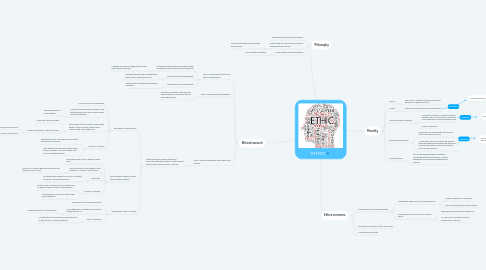
1. Philosophy
1.1. Statements we can be certain about
1.2. A philosophical approach to questions regarding good and evil
1.2.1. Not right and wrong but different perspectives
1.3. Many (phylosophical) questions
1.3.1. Re-evaluate everything
2. Ethical research
2.1. Step 1: Describing morality and the moral behaviour
2.1.1. Carefully reading, studying and describing the different moral opinions and reasoning
2.1.1.1. Pospone any form of judgement and ask sociological questions
2.1.2. Prescriptive moral judgements
2.1.2.1. Guiding and directing and regulating about what is right and wrong.
2.1.3. Descriptive moral judgements
2.1.3.1. Reporting a fact without any implied evalation
2.2. Step 2: Analyzing the descriptions
2.2.1. Ask ethical questions that will help interpretting and reflecting on the sociological facts
2.3. Step 3: Ethical judgement about the moral system
2.3.1. Three important theories which are concerned with the question: what makes a human action morally right or wrong?
2.3.1.1. First theory: utilitarianism
2.3.1.1.1. A branch of moral philosophy
2.3.1.1.2. Justifies moral behaviour based on the question: does the moral system make people (un)happy?
2.3.1.1.3. They make moral calculations when they have to make a choice, what choice results in the most happiness?
2.3.1.1.4. Points of criticism
2.3.1.2. Second theory: ethics of duty (Deontological Ethics)
2.3.1.2.1. Emphasises the duty to abide by moral rules
2.3.1.2.2. Moral actions are only based on the intention or motive of the person
2.3.1.2.3. Inner duty
2.3.1.2.4. Points of criticism
2.3.1.3. Third theory: ethics of virtue
2.3.1.3.1. The importance of learning virtues
2.3.1.3.2. Moral behaviour is learned from virtuous people around us
2.3.1.3.3. Point of criticism
3. Ethics concerns:
3.1. Two different types of statements
3.1.1. Statements which we can be certain about
3.1.1.1. Using verification or deduction
3.1.1.2. Can be considered as right or wrong
3.1.2. Statements we cannot be fully certain about
3.1.2.1. Religious and philosophical questions
3.1.2.2. You will never be able to prove it empirically or logically
3.2. The study of morality, norms and values
3.3. A philosophical faculty
4. Morality
4.1. Norms
4.1.1. The rules of conduct that prescribe what behaviour is desirable or not
4.2. Values
4.2.1. What we consider to be really important
4.3. Conflicting moral systems
4.3.1. A conflict in which you have to choose between two or more actions and have moral reasons for choosing each action.
4.3.2. Hard to overcome
4.4. Different perspectives
4.4.1. Everybody has a different view-point of what is acceptable or not
4.4.2. In everyday life in most cases we have to make split decisions because we simple do not have the time to conduct an ethical study or examination
4.5. Moral relativism
4.5.1. Any of several philosophical positions concerned with the differences in moral judgments across different peoples and cultures.

